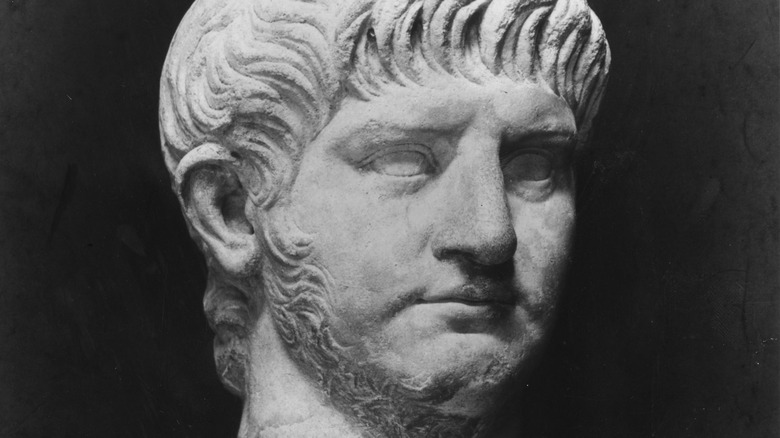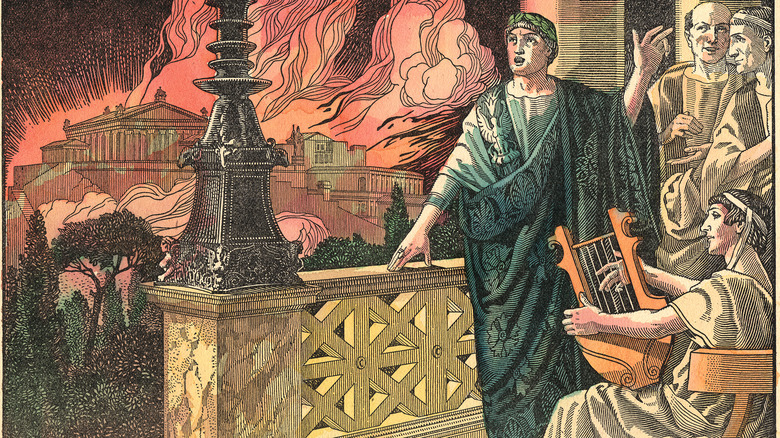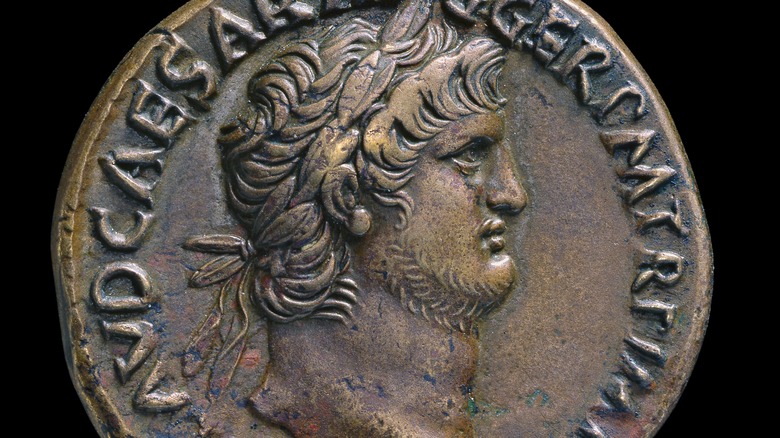The Problem With Roman Emperor Nero's Rulership
The history of Ancient Rome is filled with the names of men who murdered, partied, persecuted, or otherwise used their positions to inflict as much mayhem as possible — all while convincing the people that they were immortal gods. And at the top of the list of over-the-top Roman rulers is Nero Claudius Caesar Augustus Germanicus, or just Nero. Depending on whom you ask, he was either a great champion of the Roman citizenry or a madman who burned down the city for reasons that made sense to him. All while, according to one apocryphal tale, he supposedly played the fiddle while Rome burned, per History.
The problem with accounts of Nero's reign is that many of them came from his enemies, according to History of Yesterday. That means that history must walk the line between determining what is actual historical fact, what has a kernel of truth to it, and what was made up out of whole cloth. What's more, Nero may have been mentally ill, acting out of delusions that culminated in his taking his own life at the age of 30.
If you or anyone you know is having suicidal thoughts, please call the National Suicide Prevention Lifeline at 1-800-273-TALK (8255).
Nero might have murdered his way to the top
According to PBS, Nero was adopted at the age of two by his uncle, Emperor Claudius, thus putting him in line to the Roman throne (Rome being a hereditary monarchy at this point in history). When Claudius died — possibly with the help of Agrippa, Nero's mother — Nero took the throne at the age of 16 or 17, in A.D. 54.
The murders didn't end there. Or at least, that's the claim made by the ancient Roman writers Tacitus, Suetonius, and Cassius Dio, who all claimed that Nero had his own mother, Agrippina, murdered when she got too interested in his throne. Tacitus took things a step further, claiming that Nero had his 13-year-old stepbrother Britannicus murdered with the help of Agrippina. Of course, whether or not all of that (or any of that) is true is a matter of debate. And in the case of Britannicus' murder, the theory has been discredited. Indeed, another Roman historian, Josephus, freely admits that much of what was claimed about Nero wasn't true, as History of Yesterday notes.
Nero definitely did not fiddle while Rome burned
You may have heard the phrase "Nero fiddled while Rome burned" in the context of an allegory about someone ignoring, or even celebrating, the destruction of something. Cassius Dio — who, again, was one of Nero's enemies, per History of Yesterday — claimed that Nero had started the Great Fire of Rome because he wanted to destroy the city. Per the University of Chicago, Tacitus claimed that Nero "sang" while the city burned.
Rome did burn, that much is true, and Nero did build a new palace on land destroyed by the fire. But according to History, he was out of town when the fire started, and he's believed to have helped jump-start relief measures once he got back to town. And he certainly didn't play the fiddle while it burned since the instrument didn't exist at the time.
Following the destruction of Rome, a great persecution broke out against Christians. One historical rumor suggests that it was Nero himself who blamed them for the fire. But again, whether or not that's true is a matter of dispute.
Nero might have been mentally ill
That Nero was paranoid and delusional is beyond dispute: The life of a Roman emperor is filled with death threats and assassination attempts, and Nero, like others before him, had almost certainly learned to be suspicious. Similarly, Roman emperors not named Nero claimed to be gods, and Nero might have genuinely believed that kind of hype, according to PBS.
In 2020, University of Mary Washington scholar Cayce Walker wrote that Nero might have been legitimately mentally ill. In particular, Walker claimed that if he were alive today, he'd be treated for paranoia and delusions. "In an advanced stage of psychosis, Nero may have devolved into a delusional state where he took on, in real life, the roles of the characters that he played on stage," Walker wrote. However, they also noted that diagnosing someone with a mental illness 2,000 years after they died is a bit of a fool's errand.
Regardless of whether or not the atrocities attributed to Nero actually occurred, it's certain that suspicions about him within Rome's government eventually caught up to him. As reported by PBS, the Roman senate declared him a public enemy, and Nero took his own life at the age of 30.



